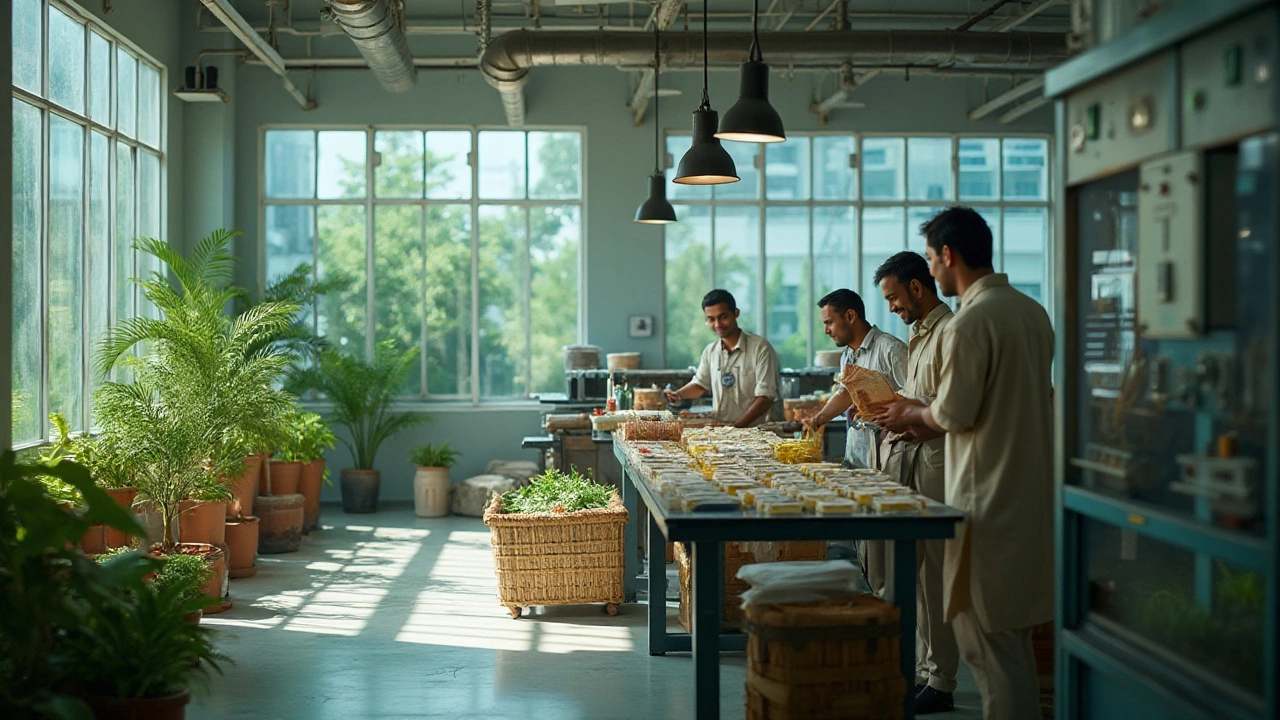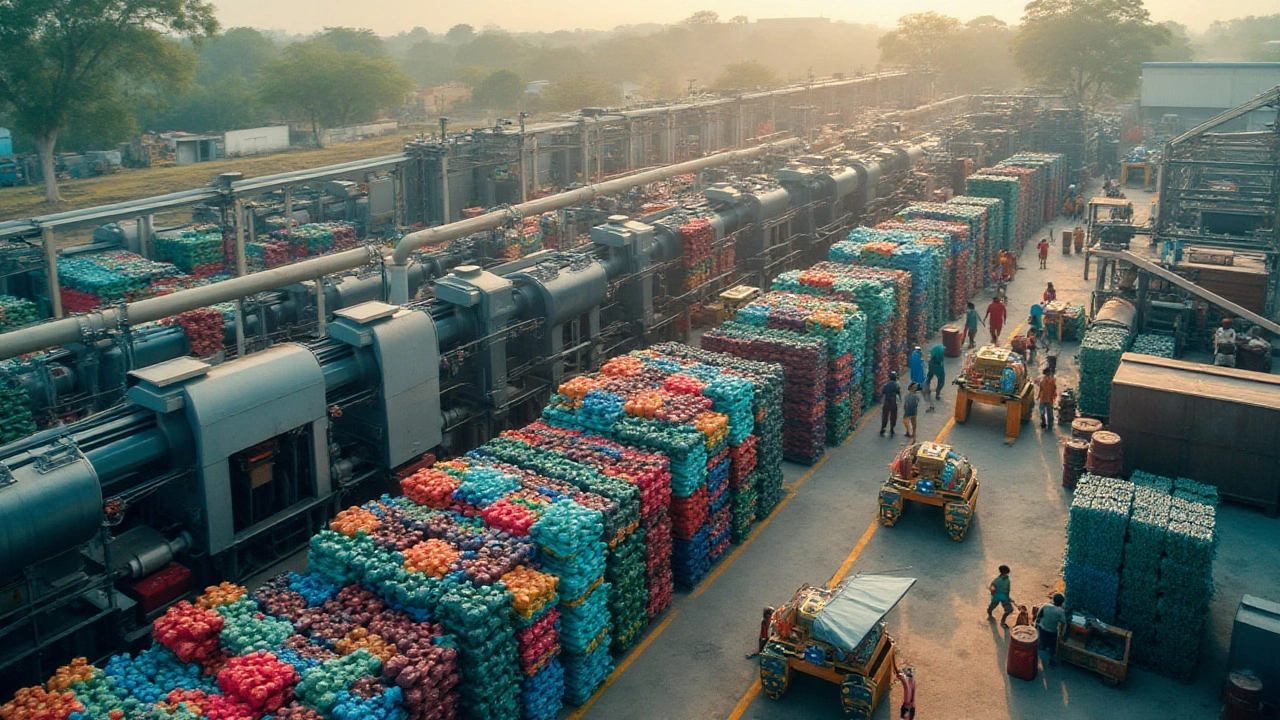In the bustling world of modern manufacturing, plastic stands out as a pivotal material that shapes various industries. From food packaging to automotive parts, plastic's versatility makes it indispensable, prompting a keen interest in its production. Identifying the giants in this field offers insights into trends, innovations, and future directions.
With environmental challenges on the horizon, understanding the biggest players in plastic manufacturing not only highlights their influence but also their efforts in steering towards a sustainable future. These companies, through innovation and technology, are redefining what it means to be leaders in one of the world's most significant industries.
- Introduction to Plastic Manufacturing Industry
- Leading Global Plastic Manufacturers
- Innovations and Sustainability Efforts
- The Future of Plastic Production
Introduction to Plastic Manufacturing Industry
In the tapestry of modern industry, the plastic manufacturing sector weaves a narrative of innovation, necessity, and adaptation. This vast and dynamic industry emerged prominently in the mid-20th century, fundamentally altering the fabric of daily life and industry operations. The versatility of plastic, with its countless forms and functions, has rendered it indispensable in sectors ranging from food packaging to aerospace. This fusion of chemistry and engineering has given birth to polymers, materials that today make up the core of numerous products in our lives.
Throughout the decades, the plastic industry has expanded exponentially, driven by technological advancements and the constant pursuit of new applications. In its earlier years, the industry faced challenges primarily concerning production limitations and cost-efficiency. However, breakthroughs in polymer sciences transformed these challenges into opportunities, significantly enhancing production capabilities and the development of new plastic types like PET and PVC. The value of the plastic market had skyrocketed to reach significant milestones in recent years, signaling its integral role across multiple verticals.
Plastic manufacturers are massive ecosystems that not only produce raw materials but also pioneer in research and development. Companies like BASF and Dow, for instance, have been at the forefront of innovations and sustainability efforts, developing biodegradable plastics and recycling methodologies to mitigate environmental impact. In an era of increasing environmental awareness, these companies are now focusing on creating a circular economy. Regulations and consumer demand push for sustainable processes, prompting the industry to not only maintain production standards but also evolve to become greener.
The global landscape of plastic manufacturing is dominated by a few key players, contributing significantly to the industry's development and evolution. Their influence stretches beyond mere production; they shape trends, regulations, and technologies that eventually determine the industry's trajectory. As the industry grows, so does its responsibility towards sustainable practices. Consumer awareness, heightened by environmental concerns, places additional emphasis on plastic manufacturers to innovate responsibly. Addressing these challenges is crucial for the industry's future, requiring cooperation among corporations, governments, and stakeholders.
The journey of plastic production over the years has shown that the industry is resilient and continually evolving. As a staple of modern development, this sector's future success hinges not only on innovation but on its ability to balance production with sustainability. The plastic industry's journey highlights the critical nexus between human ingenuity and environmental stewardship, paving the way for a future that values both progress and planet. This balance is not just a trend but a necessity, ensuring that the industry can continue to thrive in harmony with our rapidly changing world.

Leading Global Plastic Manufacturers
The plastic manufacturing landscape is vast, with several mammoth enterprises leading the charge. These companies not only contribute a staggering amount of the world's plastic supply but also pave the way for innovation and sustainability within the industry. The global demand for plastics ranging from packaging materials to engineering-grade polymers places these producers in a crucial position of responsibility. With the dominance of plastic across various sectors, exploring the key players offers insight into how the industry navigates challenges and opportunities alike.
One of the foremost names in the realm of plastic manufacturing is BASF SE. Headquartered in Germany, BASF stands as a titan in the chemical industry, with plastics forming a significant chunk of its vast product portfolio. The firm is renowned for its engineering plastics, which are used in a multitude of applications including automotive components and consumer electronics. This global player’s commitment to sustainability is reflected in its ambitious goals to reduce CO2 emissions, signaling its drive towards an eco-friendly future.
Dow Inc., another leading producer, makes an indelible mark with its innovative solutions in the plastics domain. Based in the United States, Dow has positioned itself as a frontrunner by focusing on the development of high-performance plastics that meet stringent environmental standards. By offering recyclable and bio-based alternatives, Dow addresses growing environmental concerns while supporting industries with sustainable solutions. As quoted in a recent industry analysis, "Dow’s commitment to innovation is a benchmark for the entire sector."
Wrapping up the trio of dominant forces is LyondellBasell, noted for its exceptional capacity and technological prowess. As one of the largest plastic, chemical, and refining companies in the world, LyondellBasell delivers diverse products to a multitude of sectors. This includes advanced plastics used in packaging, electronics, and construction. Their circular economy model focuses on minimizing waste and maximizing resource efficiency, an approach that highlights their leadership in sustainable manufacturing practices.
The Chinese firm, Sinopec, deserves mention as a rapidly rising star. Known for its vast industrial output, Sinopec’s petrochemical division plays an instrumental role in global industry dynamics. With expansion plans into cutting-edge renewable technologies, it's clear that Sinopec is enhancing its influence by aligning with global trends of sustainability and efficiency.
The collective efforts of these manufacturers not only shape the plastic industry's present but also influence its future trajectory. With a blend of innovation and sustainable practices, these formidable entities continue to make significant strides in meeting the world’s plastic needs while progressively leaning into eco-friendly measures.

Innovations and Sustainability Efforts
In the realm of plastic manufacturing, innovation is not merely a buzzword; it's a necessity driven by the dual goals of enhancing product performance and minimizing environmental impact. The leading players in the industry are perpetually striving to strike a balance between these two objectives. One prominent name that exemplifies this pursuit is BASF, known for its robust research and development arm. They've pioneered several biodegradable polymers, which are geared towards reducing plastic pollution. These innovative materials are designed to break down more efficiently, minimizing the long-term environmental footprint.
The commitment to sustainability is not limited to emerging products but extends deeply into the manufacturing process itself. Companies are investing heavily in technologies that reduce carbon emissions and energy consumption in production lines. For instance, Dow Chemical has implemented circular economy initiatives that recycle waste into valuable materials. The company has developed a revolutionary process that allows for the chemical recycling of plastics, which traditionally have been challenging to repurpose. By closing the loop, these efforts not only lessen the environmental burden but also open up new avenues for resource use, presenting a sustainable production model for the industry.
Collaborative Efforts in Innovation
In the journey towards sustainability, individual efforts by companies are complemented by numerous collaborative ventures. Partnerships are breeding grounds for breakthroughs, as they bring together expertise from different sectors to tackle common challenges. One such collaboration is between plastic giants and tech firms to develop smart packaging solutions that effectively reduce waste. These innovations include packaging materials that change color to indicate spoilage, thereby reducing food waste, an ever-growing concern.
Moreover, industry groups are actively engaging with academia to cultivate talent and foster innovative research. These collaborations extend beyond traditional R&D, featuring initiatives like competitions and hackathons focused on creating sustainable solutions. These efforts exemplify how the industry is leveraging diverse minds to develop groundbreaking approaches to plastic reduction and recycling, ensuring that they stay ahead in the curve of sustainable practices. A poignant example of this can be seen in a recent partnership between ExxonMobil and a leading university, where students are tasked to design the next generation of recyclable materials.
"Innovation is the engine of economic progress, and the prospects for innovation in plastics align perfectly with society's increasing demand for sustainable solutions," said Andrew Liveris, former CEO of Dow Chemical.
Technological Advancements
The plastic industry is also witnessing a technology-driven transformation that promises to redefine traditional manufacturing processes. AI and machine learning are being employed to optimize production settings, thus reducing energy use and raw material waste. This transition toward smart manufacturing is exemplified by firms adopting IoT devices throughout their production lines. These devices gather real-time data, enabling proactive maintenance and precise resource allocation, subsequently enhancing efficiency and sustainability.
In line with these technological advancements, several companies are establishing green production facilities that harness renewable energy sources. For instance, solar-powered factories and wind-generated energy systems are slowly becoming part of the mainstream. According to a report from the International Renewable Energy Agency, the adoption of dual-energy systems can reduce operational costs by up to 30% while significantly reducing the carbon footprint. Emphasizing renewable energy use in production is not only cost-effective but reflects a broader responsibility towards environmental stewardship that savvy consumers demand from their chosen brands.

The Future of Plastic Production
As we look into the future of plastic manufacturing, it's evident that sustainability will play a crucial role in shaping the industry's trajectory. There is a growing demand for eco-friendly alternatives, influenced by consumers and regulation. Leading manufacturers are investing heavily in research and development to create biodegradable plastics and enhance recycling technologies. Traditional plastics have long been criticized for their environmental impact, leading companies to explore materials that mimic the properties of conventional plastics but decompose easily. The innovation in this area is not confined to smaller companies; giants like BASF and Dow are also joining the movement. They aim to revolutionize the industry by reducing reliance on fossil fuels and embracing renewable resources.
One exciting development is the emergence of bioplastics, which offer a promising solution to the issues posed by traditional plastics. These materials are derived from biological substances as opposed to petroleum, which reduces the carbon footprint. Companies are diving deep into algae and corn-based solutions that could make plastic production more sustainable. Governing bodies across the world are also pushing for stringent regulations to curb plastic waste, further motivating the key players to innovate. This is evident in the European Union's ambitions to ensure all plastic packaging is recyclable by 2030. With such regulations in place, the industry is likely to see a shift towards closed-loop systems, where recycling is not just an option but a fundamental aspect of production.
Technological advancements are advancing the scope of polymer companies to create materials that maintain their integrity through multiple recycling loops. Companies are experimenting with chemical recycling, which breaks down plastics at a molecular level, rendering them nearly new and extending their lifecycle. This process uniquely positions the industry to decrease dependency on virgin materials sustainably. The potential for artificial intelligence and automation in optimizing production processes also stands out. By implementing modern technologies, manufacturers can precisely track and minimize waste, making operations more efficient. There's a realization across the board that the future of plastic is intertwined with intelligent design and responsible stewardship.
The financial landscape is evolving, with investors increasingly injecting capital into green technologies. This trend reflects growing global awareness about climate change and environmental health. As public perception shifts, it's expected that companies will lean towards transparency and ethical practices, aligning themselves with consumer values. An article by Forbes highlighted that "Investors are now prioritizing green bonds in portfolios, directly impacting plastic companies to innovate greener solutions."
A recent statement from the World Economic Forum noted, "The future of plastics will depend on industry leaders making a deliberate shift towards sustainable innovation, reflecting both a commitment to the environment and economic sense."
Considering these developments, the future of global plastic industry looks promising yet challenging. The roadmap ahead involves not just innovation but also a fundamental change in corporate philosophy and consumer behavior. Education and awareness will play an instrumental role, as stakeholders work together to change conventional norms. Ultimately, success will likely depend on a harmonious blend of recycling advancements, regulatory frameworks, and consumer cooperation. As we stand on the brink of transformation, the key players in plastic manufacturing have an opportunity to pave the way for a sustainable and innovative future.
